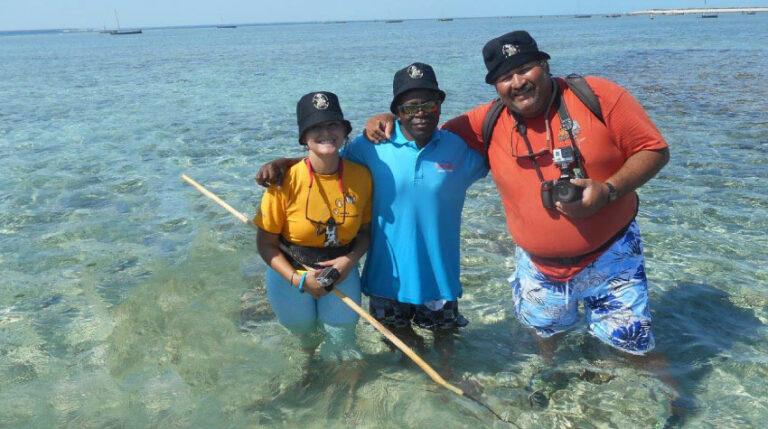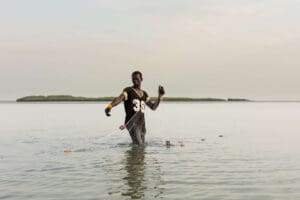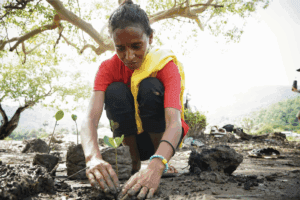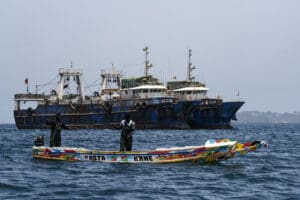Tonga soa, bienvenue, bienvenida, welcome! Late August saw the arrival in Madagascar of some very special visitors. A group of Mexican fishermen traveled more than 17,500 kilometres to have a conversation with their local counterparts about octopus. Their destination: a community-run marine conservation initiative on the Mozambique Channel, where local fishers have been managing their octopus fishery for the past decade.
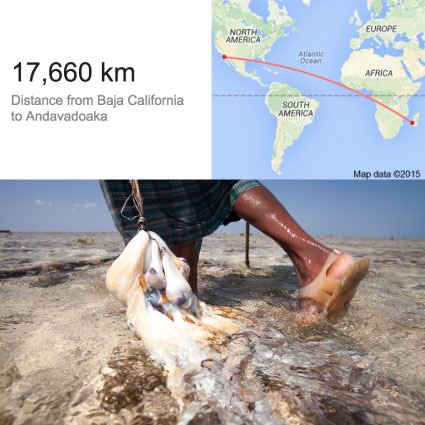 This initiative, supported by the Helmsley Charitable Trust, is fostering peer-to-peer learning and exchange as a means of supporting community-based fisheries management in two very different corners of the Indo-Pacific. From the shores of Baja California to a remote fishing village in the southwest Madagascar, the participants learned about best practices in small-scale fisheries management, exploring new ideas and approaches to sustainability, and sharing positive experiences and solutions.
This initiative, supported by the Helmsley Charitable Trust, is fostering peer-to-peer learning and exchange as a means of supporting community-based fisheries management in two very different corners of the Indo-Pacific. From the shores of Baja California to a remote fishing village in the southwest Madagascar, the participants learned about best practices in small-scale fisheries management, exploring new ideas and approaches to sustainability, and sharing positive experiences and solutions.
August’s visit saw the first leg of this remarkable exchange, with the Mexican fishers, along with representatives of Mexican conservation organisations Pronatura Noreste and Smartfish Mexico, crossing over 150 degrees of latitude to learn about short-term fisheries closures carried out in Madagascar over the past 11 years as a tool to rebuild stocks.
After receiving a warm welcome from Madagascar’s Ministry of Fisheries and Aquatic Resources in capital city Antananarivo, the travelers went to Toliara and Velondriake Locally Managed Marine Area and were introduced to all aspects of the Malagasy fishery, meeting fishermen and women, as well as seafood buyers, processors and exporters, all of whom are working together to improve the sustainability of Madagascar’s stocks – a lifeline for hundreds of thousands of small-scale fishers.
The visit culminated with the reopening of a two month local closure of the octopus fishery, where communities shared in the benefits of having set aside a series of temporary no take zones to help rebuild stocks. After local leaders reopened the closed areas to fishing, Mexican and Malagasy fished side by side, providing a unique opportunity to learn about a local solution that has helped communities tackle the growing challenge of overfishing.
The visitors also called in on local aquaculture farms to learn about efforts to pioneer economically viable alternatives to fishing. In southern Madagascar seaweed and sea cucumber farming are helping alleviate pressure on fisheries, providing communities with a new source of sustainable income.
The exchange will be concluded next year, when Malagasy community members will visit Mexico with Blue Ventures’ fisheries technicians, to learn about the creation and management of fishers’ cooperatives, as well as managed access to fisheries resources.
Roger Samba, President of the Velondriake management association said: “We are proud that Velondriake has become an example around the world. While there are many differences between our octopus fisheries and our communities, it is important for us to know we have friends as far away as Mexico who share some of the same challenges we face and are taking steps to tackle them.”
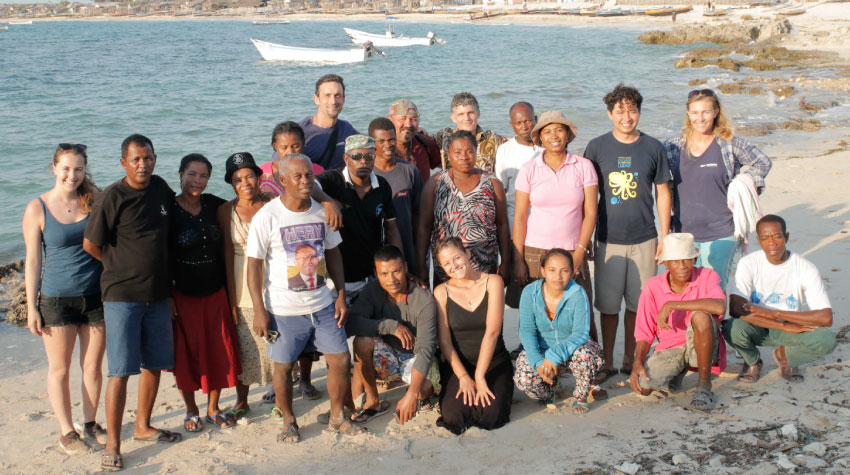 Despite being separated by two vast oceans, and coming from vastly different backgrounds and economic settings, recent experience suggests these exchanges play a powerful role in inspiring local action to tackle overfishing. Similar community visits organised between islands within the Indian Ocean over recent years have shown the enormous potential of fisher exchanges in catalysing the uptake of innovations in local fisheries management.
Despite being separated by two vast oceans, and coming from vastly different backgrounds and economic settings, recent experience suggests these exchanges play a powerful role in inspiring local action to tackle overfishing. Similar community visits organised between islands within the Indian Ocean over recent years have shown the enormous potential of fisher exchanges in catalysing the uptake of innovations in local fisheries management.
“We’re very happy with this visit, and thank the people of Velondriake for their hospitality. We’re really impressed by the management work you are doing, and hope to be able to bring back some of these ideas and enthusiasm to introduce back home in Mexico.” Francisco Urias Aviles, octopus fisher from Bahia de Los Angeles, Baja California
Gilbert Francois, General Director of fisheries at the Ministry of Fisheries and Aquatic Resources said: “While the Malagasy experience in octopus management already represented a model of best practice in Africa, it has now gone beyond the continent to reach the Pacific.
We are amazed to see how the management of octopus stocks has brought together two communities each with their own expertise, for an exchange of experience. Let this frank and close cooperation continue to strengthen for the well-being of both communities.”
Beyond the individuals and communities involved directly, this exchange trip could be an important catalyst for grassroots fisheries management in Spanish-speaking Latin America, effectively planting the seed of this short-term fishery closure model in this new region.
—–
Notes:
- Octopus fishery closures in southwest Madagascar are coordinated by the Comité de Gestion de la Pêche aux Poulpes which includes fishing communities, L’Institut Halieutique et des Science Marines of the University of Toliara, seafood buyers, NGOs and the regional fisheries service, supported by MRHP.

